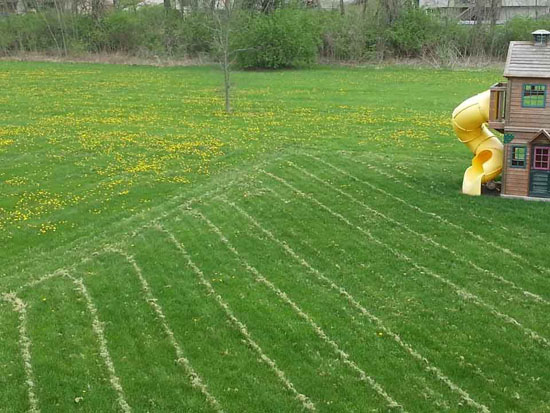Issue 2, May 12, 2014
Bad Weeds and Bad Neighbors
Plants can bring out the best and worst in people. This Mothers' Day, many will give or receive a bouquet of tulips, a hanging basket of begonias, or perhaps a shrub rose for the landscape. Unless Mom suffers from horrible allergies, these gifts will be appreciated. However, present to her a pot of skin-sticking catchweed bedstraw and she may tell you to go clean your room, even if you are over 30 years old. She will find a glass of dandelions to be acceptable only if you are a child still. It's funny how people are particular about their plants.
And they can be even pickier about their lawns. If it's not an acceptable turfgrass species, they sometimes go to great lengths to remove it from the lawn. White clover used to be included in seed mixes back in the 1950's. Today, herbicides are sought out to selectively remove the clover. Certainly, we have good reasons for wanting to control our lawn weeds. A nice uniform appearance is more often desirable by homeowners and turf managers. Certain species can cause allergic reactions. In athletic fields, weeds can lead to injuries as they don't cushion falls like turfgrass does. On golf courses, weeds affect play. Weeds such as dandelions produce seeds that have been known to blow into neighboring lawns. If one neighbor is slacking in his weed control efforts, you can bet the surrounding neighbors who are working harder will notice. Of course, some are more tolerant than others and are fine with letting a few weeds grow. Honestly, learning to live with weeds is much easier than stressing out over eliminating every single last one of them. Finally, many simply like the color that dandelion, violets, henbit, and the like add to their lawns and landscapes.
Every year, I hear about struggles that neighbors have over weeds not being controlled or perhaps being controlled in the wrong manner. Last week a coworker said that her neighbor had sprayed something on her creeping Charlie (ground ivy) and now NOTHING is growing back. She only knew because she had caught her doing it. The neighbor said she was trying to help and that she didn't like how the weed was spreading over to her property. Therefore she took matters into her own hands, which is unacceptable and illegal. In Illinois, you must have a pesticide license to spray a pesticide on someone else's property. Even if a neighbor grants permission to spray, consider the liability if something goes wrong. It has happened before.
Recently, an old friend posted this picture on Facebook of his backyard. He had this to say, "The yard is surrounded by dandelions. I may be fighting a losing battle." Then he added, "Sprayed again today. Made the kids make their "wishes" in the common ground. Wonder how much a dome is?" This made me giggle. Then another friend commiserated and suggested that they both sneak over in the middle of the night and spray a herbicide onto their neighbors' properties. I hate reading or hearing stuff like this. I know it happens though.

I encouraged my friend to have a friendly discussion with his neighbor. Invite him over to show him what you are up against. Talk about what efforts you are making and tell him why this is important to you. Maybe they will understand your situation and try to do better. Maybe they can't handle the work themselves. Volunteer your kids to help pull weeds. Your kids will LOVE you for it.
Some people have weedy lawns because they do not want to use conventional herbicides. That's fine. Raising the mowing height will also help to shade out dandelions and other broadleaf weeds such as plantains. For a "low risk" control of dandelion that works fairly well, check out the new chelated iron (a commonly used mineral) products that are available in many garden centers and labeled for weed control.
As a reminder, it is recommended that only registered and labeled pesticides be used. Carefully read and follow all label directions. It is unfortunate that the owner of the creeping Charlie infested lawn does not know what product or mixture was used. My guess is that it was Borax, a commonly used home remedy for this weed. However, if the rate is too high, the boron in the Borax renders the soil useless for growing anything – a sad situation indeed. Borax is not a registered herbicide. It comes with no label directions for rates and safety precautions. Salt is another home remedy for killing weeds that has been used by bad neighbors in the night. Long lasting damage occurs. There are better ways. Talking to your neighbor is the first step.
Some neighbors might even be a little more passive aggressive. Just this morning, I read this post on Facebook. The author is a funny man and I'm sure he was kidding, but I could see this happening by some. "Had a busy morning blowing dandelions into the yards of people I don't like." Again, I laugh but know I can do little to prevent this act from occurring. (Michelle Wiesbrook)
Author:
Michelle Wiesbrook